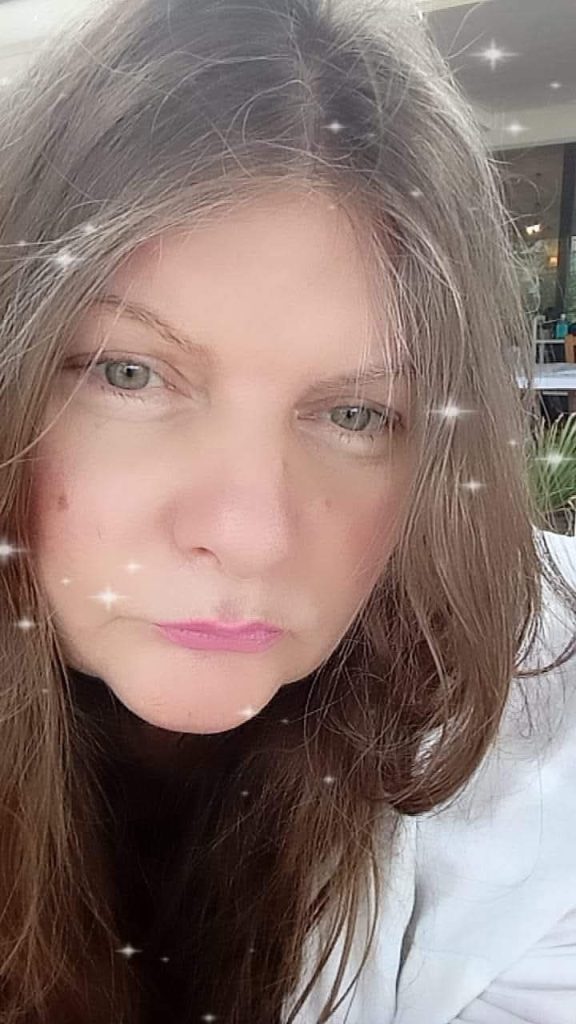
Εύα Πετρόπουλου Λιανου
“Becoming a Butterfly, Becoming a Soul: An Existential Reading of Eva Petropoulou Lianou’s Poem”
By Rizal Tanjung
Eva Petropoulou Lianou’s poem “Nothing Belongs to Us” is a lyrical utterance that holds within it layers of existential reflection, critique of anthropocentrism, and a meditation on the spirituality of the body. In the increasingly cacophonous landscape of contemporary poetry—often overwhelmed by the aesthetics of form—this piece appears typographically simple yet philosophically sharp. This essay attempts to read the poem as a poetic contemplation of freedom, the infinitude of the human condition, and a critique of the illusion of possession. Through the lenses of existentialism (Sartre, Kierkegaard) and the cosmic mysticism of Taoist thought, it seeks to delve into the poem’s pulse in order to unearth what it means to be human.
Across both Eastern and Western traditions of poetry, the question of the human self has never reached its final answer. From Walt Whitman’s Song of Myself to Laozi’s Tao Te Ching, human beings have long pondered their identity in a world relentlessly obsessed with possession, power, and selfhood. Eva Petropoulou Lianou’s poem comes as a whisper amid the clamor. With its formal simplicity yet profound meaning, it dares to challenge structures of society, belief, and even the logic of human ownership.
This poem invites a new reading of existence—fluid, self-sovereign, and spiritually free. It becomes a literary vehicle that resists the illusion of domination over oneself and nature. The central question guiding this essay is: How does the poem dismantle the myth of ownership and replace it with existential freedom and devotion to the soul?
Textual Reading: Structure and Symbolism
The poem is built from short lines, unconstrained by conventional rhyme or rhythm, yet it forms an internal cadence that is deeply reflective. Its narrative voice is declarative and intimate—as if the reader is being invited into a mirror held up by their own inner voice.
Key recurring symbols include:
“Butterfly,” “bee,” “ants,” “wolf”: Non-human beings that symbolize existence without domination.
“Laugh to your heart,” “touch the stars”: Invitations toward a spirituality born in simplicity.
“Stomach,” “instinct,” “inner soul”: The body as a center of wisdom—subverting the Western body-soul dichotomy.
The poem’s free structure becomes a metaphor for the freedom it articulates. Eva’s form reflects her message: the poem is free because it voices freedom.
Philosophical Approach: Existentialism and the Cosmology of the Body
Existentialism: Choice, Freedom, and the Absurd
Jean-Paul Sartre famously argued that human beings are “condemned to be free.” In this poem, freedom is not merely a moral choice, but a way of being—rooted in the body and instinct:
“We are choosing according to our feelings / Our thoughts / Our beliefs / Our stomach”
These lines are existential declarations: human sovereignty is not determined by external systems, but by the voice within. There is no divine hand dictating one’s fate. We belong to no one. We are the authors of our own will.
In the Kierkegaardian sense, the rejection of blind faith in systems, others, or societal order echoes through the poem:
“Show respect / Kindness / But no trust / Trust your instinct / Trust your heart”
Here, the poem becomes a manifestation of the leap of faith—not toward a god, but toward the sacred silence of the inner self.
Taoist Cosmology and the Mysticism of the Body
In Taoist tradition, human beings are not rulers of nature but parts of its flow. Eva echoes this cosmic humility in lines such as:
“We are nothing more than a fly / …than a bird”
The human body is not superior to other beings—thus, it becomes sacred in its humility. The poem rejects human exceptionalism. We are not creators, not owners. We are mere participants in the grand dance of nature, and our role is to attune, not to control.
Aesthetics of Being: The Child, the Soul, and the Stars
The poem closes with a shift into mysticism:
“Stay a happy child”
The child here becomes a symbol of ultimate spirituality: free from burden, honest in desire, filled with laughter. This is not psychological regression, but existential purity. In the symbol of the child, the poem stores a vital teaching: happiness is not a result of achievement, but a return to the most honest truth of the soul—play and dream.
Poetry as the Way Back
“Nothing Belongs to Us” is both poem and philosophy, both language and silence. It teaches that to be human is not to possess, not to know, not to rule—but to become the butterfly: fleeting, light, and meaningful through mere presence.
By weaving existentialism, the cosmology of the body, and natural symbolism, Eva Petropoulou Lianou has crafted not just a poem, but a spiritual map for those who seek meaning in a world weary of ownership. In a world overwhelmed with noise, this poem becomes the path home to a silence filled with light.
West Sumatra, 2025
References
Kierkegaard, Søren. Fear and Trembling, 1843.
Sartre, Jean-Paul. Being and Nothingness, Gallimard, 1943.
Laozi. Tao Te Ching, trans. D.C. Lau, Penguin Classics, 1963.
Whitman, Walt. Leaves of Grass, 1855.
Petropoulou Lianou, Eva. “Nothing Belongs to Us”, 2024.

Nothing belongs to us
Nothing belongs to us
We are free
We are the captain of our soul..
Nobody can say this or that and you must execute.
Nobody belongs to us
We are choosing according our feelings
Our thoughts
Our beliefs
Our stomach
The most a person make you laugh
The more u want to be with
We are nobody
We are nothing
More than the butterfly
Than the bee…
We are no creators but small ants
Or seagulls
Or wolf
Show respect
Kindness
But no trust
Trust your instinct
Trust your heart
We are nothing more than a fly
We are nothing more than a bird
Laugh to your heart
Love your inner soul
And put your frequency high
Touch the stars
Make a wish
Stay a happy child
Greek poet Eva Petropoulou Lianou
